自考英语学习笔记
自考英语二三色笔记

自考英语二三色笔记自考英语二三色笔记是指在学习和记忆英语单词和句子时,使用不同颜色的笔来标记和强调关键信息。
这种学习方法可以帮助学生更好地理解和记忆英语知识,提高学习效果。
下面将介绍一些使用三色笔记的技巧和方法。
首先,使用红色笔来标记关键词。
在学习单词和短语时,我们可以使用红色笔来标记出生词和重要词汇。
这样可以帮助我们更快地识别和记忆这些词汇。
同时,我们还可以使用红色笔来标记重要的句子和语法规则。
通过标记关键信息,我们可以在复习和记忆时更加有针对性地进行学习。
其次,使用蓝色笔来标记例句和语法练习。
在学习英语语法和句子结构时,我们可以使用蓝色笔来标记例句和语法练习。
这样可以使例句和语法规则更加醒目,便于我们复习和记忆。
同时,使用蓝色笔标记的例句和语法练习可以帮助我们更好地理解和应用语法知识。
最后,使用绿色笔来总结和归纳。
在学习英语过程中,我们可以使用绿色笔来总结和归纳重要的知识点和要点。
这样可以帮助我们更好地整理和掌握学习的内容。
使用绿色笔进行总结和归纳也可以帮助我们更好地回顾和复习知识,加深记忆。
此外,使用三色笔记的过程中还需要注意一些技巧。
首先,要保持笔记的整洁和有序。
使用不同颜色的笔来标记和强调信息时,要注意书写的规范和整齐。
其次,要适度使用颜色。
过度使用颜色可能会造成混乱和困惑,所以在使用三色笔记时要适度,不要过分使用颜色。
最后,要结合其他学习方法。
三色笔记只是一种辅助学习的方法,我们还需要结合其他学习方法,如阅读、听力和口语练习等,全面提高英语能力。
总之,自考英语二三色笔记是一种有助于学习和记忆英语的有效方法。
通过使用不同颜色的笔来标记和强调关键信息,我们可以更好地理解和记忆英语知识,提高学习效果。
在使用三色笔记时,我们要注意保持笔记的整洁和有序,适度使用颜色,并结合其他学习方法,全面提高英语能力。
希望以上内容对您有所帮助。
自考英语一讲坐笔记

Text A???? How to be a successful language learner?
本课主要单词
1. successful adj. 成功的
He is a successful writer. (他是一个有成就的作家。)
He hopes he will be successful this time. (他希望他这次能够成功。)
4. 名词后缀 -ence
intelligence, independence
5. 形容词后缀 -ful
successful, purposeful
6. 副词后缀 -ly
conversely, regularly, purposefully
7. 反义词前缀 in
disagreement n. 不同意
We haven't reached an agreement yet.(我们还没达成协议。)
There was no disagreement, and the proposal was accepted.(没有不同意见,这个建议被接受了。)
本课主要词缀
1. 名词后缀 -ment
agreement, statement
2. 名词后缀 -ation, -ion, -sion
communication, completion, conclusion
3. 名词后缀 -ity
similarity, regularity
5. guarantee n. & v. 保证,担保,保修
He gave his guarantee that he would repay the money as soon as he could.(他保证他会尽快还钱。)
英语大自考复习笔记

By+分数/百分数/数字表示增加或减少的量,因此,reduce。
by a factor of five :…减少了五分之一。
大幅度增加:increased substantially自考“英汉翻译教程”复习笔记(5)UNIT 4 ECONOMY1.President Clinton realized——as all of us must——that today‘s economy is global.正如每个人必须认识到的那样,克林顿总统认识到当今的经济具有全球性质。
2.1977,the sum total of Chinese imports and exports was less than $15 billion,putting China‘s share of world at 0.6 percent. Themost populous country in the world,China ranked a distant 30th among exporting nations. By 1993 China’s exports and imports totaled nearly $200 billion. China had become the world‘s tenth largest exporter.在1977年,中国进出口总额还不到150亿美元,仅占世界贸易总额的0.6%,世界上人口最多的中国在出口国家中排名靠后,仅是第30位,到1993年,中国进出口总额接近2000亿美元,它已成为每10个最大的出口国。
3.Per capita GNP has grown at an average rate of 7.6% from 1980-1992. 从1980年至1992年,人均国民生产总值平均增长率为7.6%.4.But the importance of trade in our economy has exploded in the past three decades. In 1970,the value of two way trade wasequal to just 13% of the US economy. Last year,that figure,at 28%,was more than twice as high. In just the last seven years,jobs supported by US exports have risen by 4 million,to a total of 11 million. That‘s almost one out of ten American jobs. Last year US trade equaled $1.8 trillion dollars. 但在过去30年中,我们经济贸易的重要性大大地增加了,在1970年,双边贸易的总值占了整个美国经济的13%.去年上升到28%,比1970年增加了一倍多。
自考“英语(一)”笔记(3)
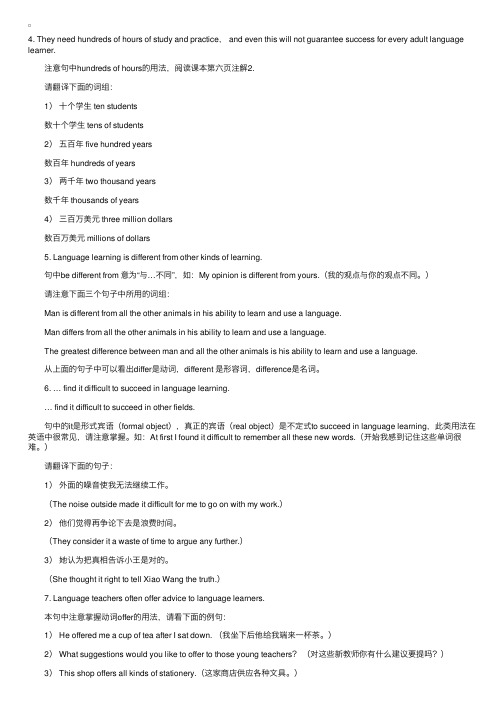
4. They need hundreds of hours of study and practice, and even this will not guarantee success for every adult language learner. 注意句中hundreds of hours的⽤法,阅读课本第六页注解2. 请翻译下⾯的词组: 1)⼗个学⽣ ten students 数⼗个学⽣ tens of students 2)五百年 five hundred years 数百年 hundreds of years 3)两千年 two thousand years 数千年 thousands of years 4)三百万美元 three million dollars 数百万美元 millions of dollars 5. Language learning is different from other kinds of learning. 句中be different from 意为“与…不同”,如:My opinion is different from yours.(我的观点与你的观点不同。
) 请注意下⾯三个句⼦中所⽤的词组: Man is different from all the other animals in his ability to learn and use a language. Man differs from all the other animals in his ability to learn and use a language. The greatest difference between man and all the other animals is his ability to learn and use a language. 从上⾯的句⼦中可以看出differ是动词,different 是形容词,difference是名词。
自考英语(一)课堂笔记完整版(33)
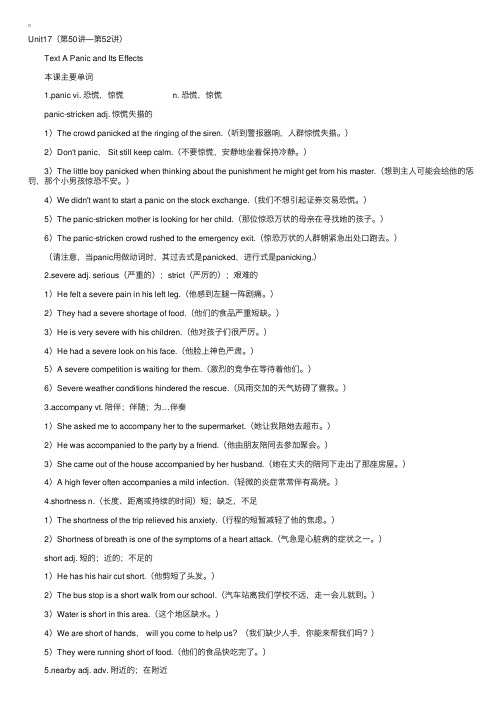
Unit17(第50讲—第52讲) Text A Panic and Its Effects 本课主要单词 1.panic vi. 恐慌,惊慌 n. 恐慌,惊慌 panic-stricken adj. 惊慌失措的 1)The crowd panicked at the ringing of the siren.(听到警报器响,⼈群惊慌失措。
) 2)Don't panic, Sit still keep calm.(不要惊慌,安静地坐着保持冷静。
) 3)The little boy panicked when thinking about the punishment he might get from his master.(想到主⼈可能会给他的惩罚,那个⼩男孩惊恐不安。
) 4)We didn't want to start a panic on the stock exchange.(我们不想引起证券交易恐慌。
) 5)The panic-stricken mother is looking for her child.(那位惊恐万状的母亲在寻找她的孩⼦。
) 6)The panic-stricken crowd rushed to the emergency exit.(惊恐万状的⼈群朝紧急出处⼝跑去。
) (请注意,当panic⽤做动词时,其过去式是panicked,进⾏式是panicking.) 2.severe adj. serious(严重的);strict(严厉的);艰难的 1)He felt a severe pain in his left leg.(他感到左腿⼀阵剧痛。
) 2)They had a severe shortage of food.(他们的⾷品严重短缺。
) 3)He is very severe with his children.(他对孩⼦们很严厉。
自考英语笔记一
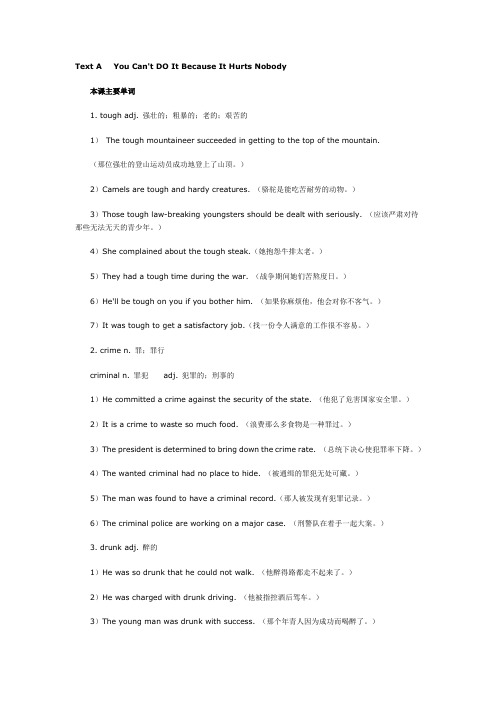
Text A You Can't DO It Because It Hurts Nobody本课主要单词1. tough adj. 强壮的;粗暴的;老的;艰苦的1)The tough mountaineer succeeded in getting to the top of the mountain.(那位强壮的登山运动员成功地登上了山顶。
)2)Camels are tough and hardy creatures. (骆驼是能吃苦耐劳的动物。
)3)Those tough law-breaking youngsters should be dealt with seriously. (应该严肃对待那些无法无天的青少年。
)4)She complained about the tough steak.(她抱怨牛排太老。
)5)They had a tough time during the war. (战争期间她们苦熬度日。
)6)He'll be tough on you if you bother him. (如果你麻烦他,他会对你不客气。
)7)It was tough to get a satisfactory job.(找一份令人满意的工作很不容易。
)2. crime n. 罪;罪行criminal n. 罪犯adj. 犯罪的;刑事的1)He committed a crime against the security of the state. (他犯了危害国家安全罪。
)2)It is a crime to waste so much food. (浪费那么多食物是一种罪过。
)3)The president is determined to bring down the crime rate. (总统下决心使犯罪率下降。
)4)The wanted criminal had no place to hide. (被通缉的罪犯无处可藏。
自考英语重点笔记
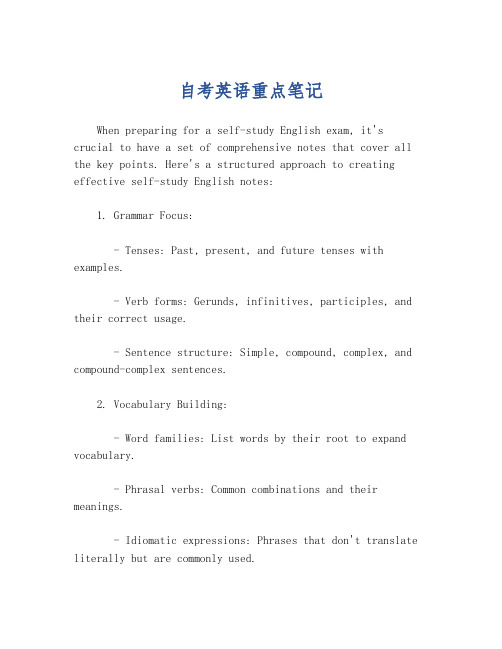
自考英语重点笔记When preparing for a self-study English exam, it's crucial to have a set of comprehensive notes that cover all the key points. Here's a structured approach to creating effective self-study English notes:1. Grammar Focus:- Tenses: Past, present, and future tenses with examples.- Verb forms: Gerunds, infinitives, participles, and their correct usage.- Sentence structure: Simple, compound, complex, and compound-complex sentences.2. Vocabulary Building:- Word families: List words by their root to expand vocabulary.- Phrasal verbs: Common combinations and their meanings.- Idiomatic expressions: Phrases that don't translate literally but are commonly used.3. Reading Comprehension:- Skimming: Techniques for quickly identifying the main idea.- Scanning: How to find specific information within a text.- Critical reading: Analyzing the text for deeper understanding and inference.4. Writing Skills:- Essay structure: Introduction, body paragraphs, and conclusion.- Formal and informal language: When and how to use each.- Common writing errors: Subject-verb agreement, articles, and prepositions.5. Listening Practice:- Active listening: Strategies for better comprehension.- Note-taking: How to jot down key points while listening.- Distinguishing between similar sounds: Practice withminimal pairs.6. Speaking Proficiency:- Pronunciation: Correct articulation of difficult sounds.- Fluency: Building sentences without long pauses.- Conversational skills: Questions, responses, andturn-taking.7. Cultural Notes:- Social norms: Understanding cultural references and etiquette.- Slang and colloquialisms: Usage in different regions.8. Exam Strategies:- Time management: Allocating time for each section of the exam.- Stress management: Techniques to stay calm duringthe exam.- Multiple-choice questions: Tips for eliminatingwrong answers.9. Practice Exercises:- Sample questions: Types of questions that could appear on the exam.- Answer key: Solutions with explanations.10. Resources:- Recommended reading: Books, articles, and websites for further study.- Online tools: Language learning apps and websites.- Study groups: Benefits and how to find or form one.Remember, consistency is key in language learning. Regularly review your notes, practice speaking, and immerse yourself in the language as much as possible. Good luck with your self-study journey!。
自考英语(一)课堂笔记完整版(4)
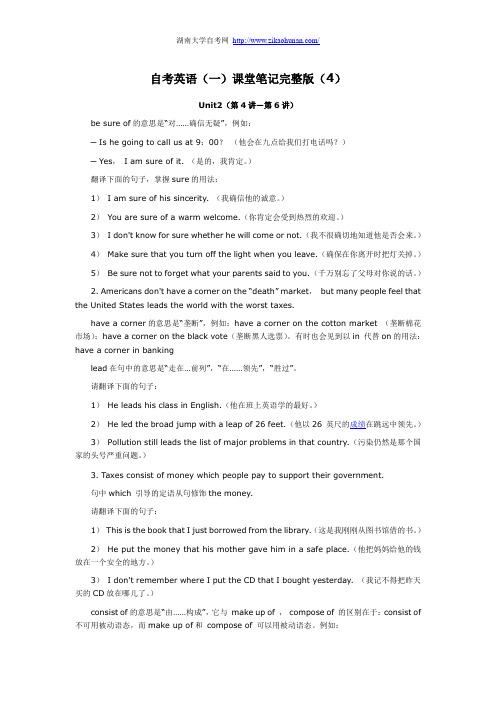
自考英语(一)课堂笔记完整版(4)Unit2(第4讲—第6讲)be sure of的意思是“对……确信无疑”,例如:─ Is he going to call us at 9:00?(他会在九点给我们打电话吗?)─ Yes,I am sure of it. (是的,我肯定。
)翻译下面的句子,掌握sure的用法:1)I am sure of his sincerity. (我确信他的诚意。
)2)You are sure of a warm welcome.(你肯定会受到热烈的欢迎。
)3)I don't know for sure whether he will come or not.(我不很确切地知道他是否会来。
)4)Make sure that you turn off the light when you leave.(确保在你离开时把灯关掉。
)5)Be sure not to forget what your parents said to you.(千万别忘了父母对你说的话。
)2. Americans don't have a corner on the “death” market,but many people feel that the United States leads the world with the worst taxes.have a corner的意思是“垄断”,例如:have a corner on the cotton market (垄断棉花市场);have a corner on the black vote(垄断黑人选票)。
有时也会见到以in 代替on的用法:have a corner in bankinglead在句中的意思是“走在…前列”,“在……领先”,“胜过”。
请翻译下面的句子:1)He leads his class in English.(他在班上英语学的最好。
自考英语二(课堂笔记_语法部分)

综合英语二(课堂笔记_语法部分)一、谓语动词It is + adj. + to do /for to do主语+ 系动词+ to doabout to dogoing to doI have nothing to do but read the novel.but——但是,可以+不定式,前有“do”后无“to”抽象名词/chance/way/power/ability/opportunity/promise/capacity/occasionTo match up with others, we must study harder.We should study harder to catch up with others.句首有逗号,译为“为了”,句末无逗号,译为“以便”The reason given was that the acid in the orange juice would make the milk curdle and become indigestible.Only 25 percent of all diamonds mined are good enough for cutting into gems.Work together to control the amount of violent programs watched and the number of violent toys found in the home.First, we find that the number depends, of course, on the items involved.1、动词不定式、现在分词、动名词、过去分词作表语的区别。
We are to study current science.He is to do the experiment in physics.不定式作表语表示将来的行为。
英语二自学教程笔记
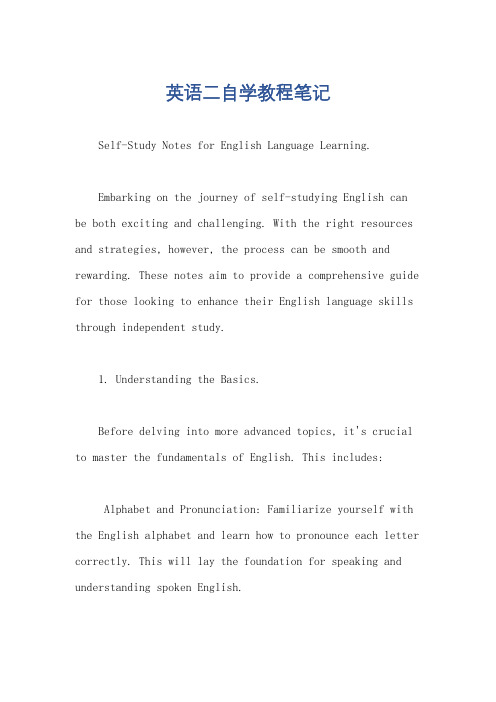
英语二自学教程笔记Self-Study Notes for English Language Learning.Embarking on the journey of self-studying English can be both exciting and challenging. With the right resources and strategies, however, the process can be smooth and rewarding. These notes aim to provide a comprehensive guide for those looking to enhance their English language skills through independent study.1. Understanding the Basics.Before delving into more advanced topics, it's crucial to master the fundamentals of English. This includes:Alphabet and Pronunciation: Familiarize yourself with the English alphabet and learn how to pronounce each letter correctly. This will lay the foundation for speaking and understanding spoken English.Vocabulary: Building a rich vocabulary is essentialfor effective communication. Start by learning common words and phrases, and gradually expand your vocabulary through reading and listening to native speakers.Grammar: Understanding the rules of English grammar is key to writing and speaking correctly. Master the basics of sentence structure, parts of speech, and punctuation.2. Improving Listening Skills.Listening is a crucial skill in language learning. Here are some tips to improve your listening abilities:Watch English Movies and TV Shows: This is a great way to immerse yourself in the language and improve your understanding of spoken English. Start with subtitles if necessary, and gradually try to understand the dialogue without them.Listen to English Music:除了看电影和电视节目,听英语音乐也是提高听力技能的好方法。
自考英语(一)课堂笔记(unit2)

typewriter(打字机) typist(打字员)
3.salary n. 工资 v. (常用被动语态)给…发薪salaried adj. 拿薪水的,领工资的She was happy to know that she would get a promotion and an increase in salary.(得知她将得到提级和加薪,她很开心。)
A great diversity of methods has been tried in doing this experiment.(实验中尝试过各种各样的方法。)
14.confuse v. 使混乱,混淆confusion n. 混乱,慌乱What he said just now confuses all of us.(他刚才说的话把我们都弄糊涂了。)
Figure out the expenses and see if we have enough money.(算一算费用,看看我们的钱是否够。)
She brought an umbrella as she figured they might need it.(她带了一把伞,因为她估计他们会需要。)
Charge your glasses and drink to our friendship.(斟满杯,为我们的友谊干杯。)
The charge for a front-row seat is 250 yuan.(前排座位票价250元。)
The police arrested him on a charge of murder.(警察以谋杀罪拘捕了他。)
Who will be in charge of our class when the teacher is away?(老师不在的时候,谁管我们班?)
自考英语二复习笔记
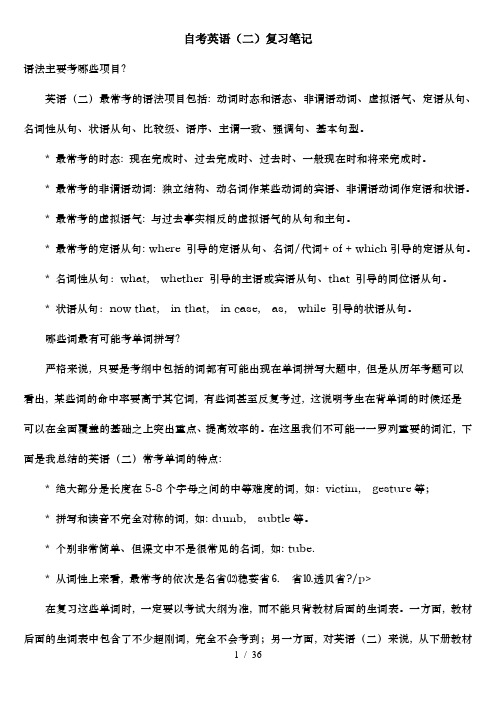
自考英语(二)复习笔记语法主要考哪些项目?英语(二)最常考的语法项目包括: 动词时态和语态、非谓语动词、虚拟语气、定语从句、名词性从句、状语从句、比较级、语序、主谓一致、强调句、基本句型。
* 最常考的时态: 现在完成时、过去完成时、过去时、一般现在时和将来完成时。
* 最常考的非谓语动词: 独立结构、动名词作某些动词的宾语、非谓语动词作定语和状语。
* 最常考的虚拟语气: 与过去事实相反的虚拟语气的从句和主句。
* 最常考的定语从句: where 引导的定语从句、名词/代词+ of + which引导的定语从句。
* 名词性从句:what, whether 引导的主语或宾语从句、that 引导的同位语从句。
* 状语从句:now that, in that, in case, as, while 引导的状语从句。
哪些词最有可能考单词拼写?严格来说, 只要是考纲中包括的词都有可能出现在单词拼写大题中, 但是从历年考题可以看出, 某些词的命中率要高于其它词, 有些词甚至反复考过, 这说明考生在背单词的时候还是可以在全面覆盖的基础之上突出重点、提高效率的。
在这里我们不可能一一罗列重要的词汇, 下面是我总结的英语(二)常考单词的特点:* 绝大部分是长度在5-8个字母之间的中等难度的词, 如:victim, gesture等;* 拼写和读音不完全对称的词, 如: dumb, subtle等。
* 个别非常简单、但课文中不是很常见的名词, 如: tube.* 从词性上来看, 最常考的依次是名省⑿稳荽省⒍省⒑透贝省?/p>在复习这些单词时, 一定要以考试大纲为准, 而不能只背教材后面的生词表。
一方面, 教材后面的生词表中包含了不少超刚词, 完全不会考到;另一方面, 对英语(二)来说, 从下册教材生词表中出的单词只占三分之一, 不可能涵盖所有要考的内容。
同样在复习时一定要讲究准确性, 确保背一个记准一个, 而不能只是记个大概, 最后写出来每个都差不多但每个都有错。
自考英语二(课堂笔记_课文部分)

综合英语二(课堂笔记)Unit11、主语+find/think+it+形容词+to do(it为形式宾语,to do是真正的主语)We find it no easy to master two foreign language in the same time.2、in、at不译为“上、里”时,译为“用、以”3、下列动词要用动名词做宾语。
practice/finish/stop/delay/suggest/consider/can’t help(禁不住)4、It is+形容词+to do(for…to)1)、It is very important to do more exercise.1)、It is very important for us to study English well.5、抽象名词(may、chance、power、decision)+ to do 不定式做抽象名词的定语。
6、无生命名词很有可能后面加上过去分词,有生命名词很有可能加上现在分词。
7、不定式放在句尾,译为“以便”,目的状语。
8、主语+系动+to do(将要)主语+系动+about to do(即将)主语+系动+going to do(打算做某事)课后练习翻译答案:P101、Research shows the successful language learners are similar in manyways.2、Language learning is active learning learners should look for everychance to use the language.3、Learning language should be independent active and purposeful.4、Learning a language is different from learning math.5、Teachers often communicate the successful experience in language. P121、They find it hard to master a foreign language.2、The research shows that the successful language learners are similarin many ways.4、We are willing to help our friends.Unit21、lead…with 以…领先The company leads the city with the best services.2、形容词本身有其他词修饰时,常放在名词后做后置定语。
自考英语二重点语法复习笔记
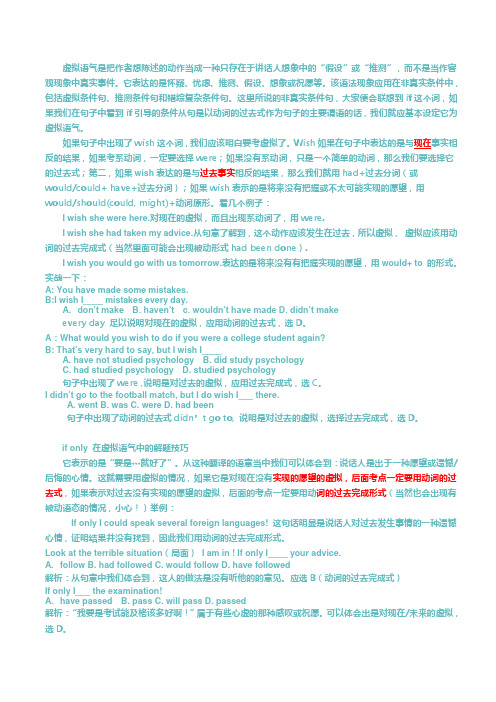
虚拟语气是把作者想陈述的动作当成一种只存在于讲话人想象中的“假设”或“推测”,而不是当作客观现象中真实事件。
它表达的是怀疑、忧虑、推测、假设、想象或祝愿等。
该语法现象应用在非真实条件中,包括虚拟条件句、推测条件句和错综复杂条件句。
这里所说的非真实条件句,大家便会联想到if这个词,如果我们在句子中看到if引导的条件从句是以动词的过去式作为句子的主要谓语的话,我们就应基本设定它为虚拟语气。
如果句子中出现了wish这个词,我们应该明白要考虚拟了。
Wish如果在句子中表达的是与现在事实相反的结果,如果考系动词,一定要选择were;如果没有系动词,只是一个简单的动词,那么我们要选择它的过去式;第二,如果wish表达的是与过去事实相反的结果,那么我们就用had+过去分词(或would/could+ have+过去分词);如果wish表示的是将来没有把握或不太可能实现的愿望,用would/should(could, might)+动词原形。
看几个例子:I wish she were here.对现在的虚拟,而且出现系动词了,用were.I wish she had taken my advice.从句意了解到,这个动作应该发生在过去,所以虚拟,虚拟应该用动词的过去完成式(当然里面可能会出现被动形式had been done).I wish you would go with us tomorrow.表达的是将来没有有把握实现的愿望,用would+ to的形式。
实战一下:A: You have made some mistakes.B:I wish I____ mistakes every day.A. don‟t makeB. haven‟t c. wo u ldn‟t have made D. didn‟t makeevery day 足以说明对现在的虚拟,应用动词的过去式,选D。
A:What would you wish to do if you were a college student again?B: That‟s very hard to say, but I wish I____A. have not studied psychologyB. did study psychologyC. had studied psychologyD. studied psychology句子中出现了were ,说明是对过去的虚拟,应用过去完成式,选C。
自考00015英语二重点语法复习笔记

自考00015英语二重点语法复习笔记1. 一般现在时(Simple Present Tense)1.1 定义与用法:一般现在时表示经常性、习惯性的动作或存在的状态。
常用时间状语有:always, usually, often, sometimes, every day/week/month/year, on weekends等。
1.2 谓语动词的构成:一般现在时的谓语动词构成:(1)一般动词:原形(2)第三人称单数(he/she/it):动词原形 + "s" / "es"(3)不可数名词或复数名词:动词原形1.3 示例:(1)I always go to bed early.(我总是早睡。
)(2)She watches TV every evening.(她每天晚上都看电视。
)(3)They eat breakfast at home.(他们在家吃早餐。
)2. 进行时态(Present Continuous Tense)2.1 定义与用法:进行时态表示现在正在进行的动作。
它一般用于表示现阶段的动作,常用时间状语有:now, at the moment, at present等。
2.2 谓语动词的构成:进行时态的谓语动词构成:be动词(am/is/are) + 现在分词(-ing形式)2.3 示例:(1)She is studying in the library now.(她现在正在图书馆学习。
)(2)We are watching a movie at the moment.(我们现在正在看电影。
)(3)He is eating dinner with his family.(他正在和家人一起吃晚饭。
)3. 一般过去时(Simple Past Tense)3.1 定义与用法:一般过去时表示过去某个时间发生的动作或存在的状态。
常用时间状语有:yesterday, last week/month/year, in 1999等。
专升本自考英语考试备考详细学习笔记
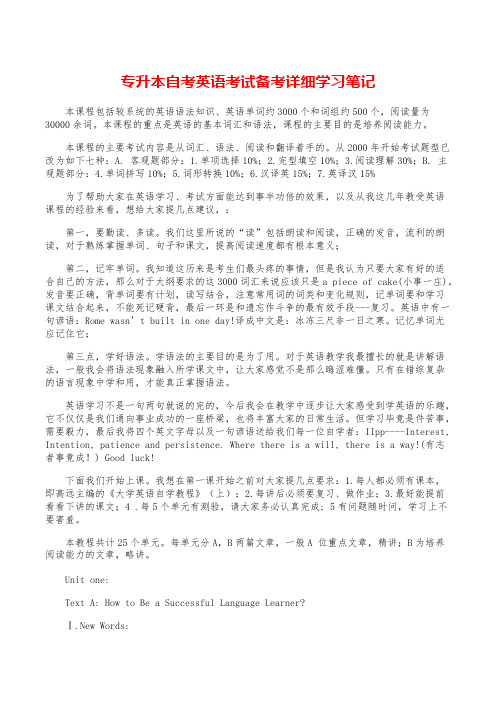
第一,要勤读、多读。我们这里所说的“读”包括度都有根本意义;
第二,记牢单词。我知道这历来是考生们最头疼的事情,但是我认为只要大家有好的适 合自己的方法,那么对于大纲要求的这 3000 词汇来说应该只是 a piece of cake(小事一庄)。 发音要正确,背单词要有计划,读写结合,注意常用词的词类和变化规则,记单词要和学习 课文结合起来,不能死记硬背,最后一环是和遗忘作斗争的最有效手段---复习。英语中有一 句谚语:Rome wasn’t built in one day!译成中文是:冰冻三尺非一日之寒。记忆单词尤 应记住它;
下面我们开始上课。我想在第一课开始之前对大家提几点要求:1.每人都必须有课本, 即高远主编的《大学英语自学教程》(上);2.每讲后必须要复习、做作业;3.最好能提前 看看下讲的课文;4 .每 5 个单元有测验,请大家务必认真完成; 5 有问题随时问,学习上不 要害羞。
本教程共计 25 个单元。每单元分 A,B 两篇文章,一般 A 位重点文章,精讲;B 为培养 阅读能力的文章,略讲。
专升本自考英语考试备考详细学习笔记
本课程包括较系统的英语语法知识、英语单词约 3000 个和词组约 500 个,阅读量为 30000 余词。本课程的重点是英语的基本词汇和语法,课程的主要目的是培养阅读能力。
本课程的主要考试内容是从词汇、语法、阅读和翻译着手的。从 2000 年开始考试题型已 改为如下七种:A. 客观题部分:1.单项选择 10%;2.完型填空 10%;3.阅读理解 30%;B. 主 观题部分:4.单词拼写 10%;5.词形转换 10%;6.汉译英 15%;7.英译汉 15%
- 1、下载文档前请自行甄别文档内容的完整性,平台不提供额外的编辑、内容补充、找答案等附加服务。
- 2、"仅部分预览"的文档,不可在线预览部分如存在完整性等问题,可反馈申请退款(可完整预览的文档不适用该条件!)。
- 3、如文档侵犯您的权益,请联系客服反馈,我们会尽快为您处理(人工客服工作时间:9:00-18:30)。
自考英语学习笔记本篇详细介绍了自考英语学习笔记内容,在词汇和短语方面有所欠缺的自考同学可以学习一下,希望能给自考生带来帮助。
祝自考生学习开心,考试顺利。
Failing to be impressed by a friend's collection of stamps,yawning when a golfer tells you about what great shot he made… are all things that educated people try not to do. 本句中三个并列的动名词短语做主语,整个句子是一个“主语+系动词+表语”的句型。
如: 1)Smoking is not good for your health. (吸烟有害你的健康。
) 2) Making experiment is one way of learning. (实验是学习的一条途径。
) be impressed by 意思是“给…深刻印象”。
如: 1)I was impressed by his talent. (他的才干给我留下了深刻的印象。
) 2)He was impressed by the gorgeous sunset. (绚丽的夕阳给他留下了深刻的印象。
) golfer意思为“高尔夫球运动员”,这个词是由golf加后缀-er构成的,英语中这一类词很多。
如:baker (面包师傅),gardener (园丁),miller (磨坊主),singer (歌唱家),user (使用者。
) 1) He tried not to let out the secret. (他试图不泄露秘密。
) 2) We tried not to be misled by them. (我们努力不被他们误导。
) 3. There are no laws enforcing respect. 本句是一个There be + noun + V-ing 结构,表示存在(有),there 失去表示场所的意义。
如: 1) There was a fire burning in the fireplace. (壁炉里火在燃烧。
) 2) There were two bulldozers knocking the place flat. (两台推土机把那儿夷平。
) 句中的enforce是一个及物动词,意思是“实施;强制”。
如: 1) It is necessary to enforce discipline in the army. (在部队里执行纪律是必要的。
) 2) He strongly objected to enforcing obedience on children. (他强烈反对强迫儿童服从。
) 4. These guidelines represent what a majority of people consider acceptable and what they consider unacceptable. represent在本句中做及物动词用,意思是“代表;体现”。
如: 1) The blue lines on the map represent rivers. (地图上的蓝线代表河流。
) 2) These views don't represent the real thinking of the local residents.(那些观点并不反映当地居民的真实思想。
) 句中what引导的是宾语从句,如: 1) I will always remember what my mother said to me before I went to college.(我将永远记住我上大学前妈妈对我说的话。
) 2) I didn't see what they were doing there. (我没看见他们在那儿干什么。
) 3)His idea couldn't represent what the ordinary people really liked.(他的想法不能代表普通百姓真正所喜欢的东西。
) consider是一个常用动词,通常有以下几种用法: 1) consider + 宾语 He had no time to consider the matter. (他没有时间考虑这件事。
) 2) consider + 宾语 + 宾语补足语 Some people considered the attack a mistake. (有人认为那次进攻是个错误。
) 3) consider + that 从句 We consider that the young man is not guilty. (我们认为那个年轻人无罪。
) 4) consider + V. + ing He considered changing his job. (他考虑换一份工作。
) 5) consider to be/as They consider themselves to be very lucky. (他们认为自己很幸运。
) He is considered to be an authority. (他被认为是权威。
) They considered the house as beautiful. (他们认为那房子很美。
) 在上面的三个例句中,to be和as都可以被省略,因此三例句可以改写为: They consider themselves lucky. He is considered an authority. They consider the house beautiful. 5. They are not even aware that this habit will bother the other members of the audience. aware这个形容词很常用,需好好掌握,在第十二单元中我们已经接触过这个词,在此再巩固一下。
1) be aware of If you were aware of all that, you would change your mind. (如果你知道了那一切,你会改变主意的。
) 2) be aware that He was aware that he had drunk too much. (他知道他喝的太多了。
) bother在本句中做动词用,意思是“打扰”。
在bother后用不定式则表示“费心去做某事”。
如: 1) Don't bother me, I have to finish the work in an hour. (别打扰我,我得在一小时内做完这个工作。
) 2) Don't bother to talk to him. He has no interest in anything. (别费心跟他讲话,他对什么都没兴趣。
) audience (观众,听众)当一个整体看待,用做单数;当各成员看待,用做复数。
如: 1) The audience was (were) enjoying the performance. (观众在欣赏演出。
) 2) That book has a large audience. (那本书有广大的读者。
) 6. …the look-at-me phone users whose boring conversations are just as dangerous to our mental health as smoke is to our lungs. look-at-me是作者自造的复合形容词,意思是“看我多神气”。
as dangerous…as…形容词的同等比较,意思是“与……同样危险”。
这句话的意思是“如同吸烟有害我们的肺一样,'那些瞧我多神气'的移动电话使用者的无聊谈话有害我们的精神健康。
” 英语学习中,经常会有不善区别现在分词做形容词和过去分词做形容词的用法和词意的情况,请看下列例句: A. interested interesting 1. He is interested in that book. 2. The book is interesting B. excited exciting 1. We were very excited on hearing the news. 2. The exciting news was soon spread all over the country. C. bored boring 1. The audience was bored by the speaker's empty talk. 2.The boring lecture made my sleepy. 7. …they listen to their walkmans while the teacher is talking to them. listen是一个不及物动词,后面必须加介词to才可以跟宾语,如:听音乐(listen to music),听收音机(listen to the radio),听天气预报(listen to the weather forecast)。
请注意,不能丢掉介词to. walkman指随身听。
注意其复数形式是在后面加-s,而不是把man改成men. 8. Kids who have no idea what being polite means will pay the price sooner or later. have no idea of sth. 意思是“对……不理解”。
have no idea后面接从句,常可省去of,如: 1)He had no idea what was likely to happen next. (他无法预料接下去会出现什么情况。
) 2)I have no idea why she left.(我不知道她为什么离去。
) polite是形容词,前面必须用系动词,而在what从句中,做主语用的系动词be则要变成being.如: Being honest means telling no lies. (诚实意味着不说谎话。
) 句子中的who引导的是一个定语从句,修饰kids,而what则引导了一个同位语从句,对idea的内容加以解释。
如: 1)I have no idea what will turn up. 2)I have no idea how soon they will arrive. 3)Word came that they had succeeded. pay the price意思是“付出代价”。
